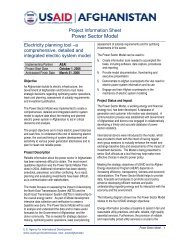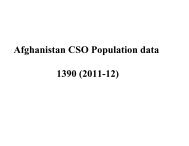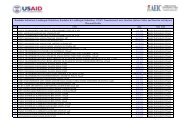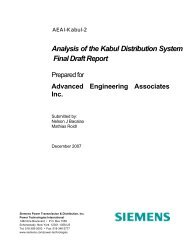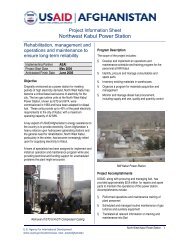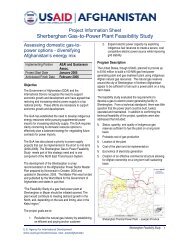prioritization and implementation plan - Cooperazione Italiana allo ...
prioritization and implementation plan - Cooperazione Italiana allo ...
prioritization and implementation plan - Cooperazione Italiana allo ...
Create successful ePaper yourself
Turn your PDF publications into a flip-book with our unique Google optimized e-Paper software.
2. Programs based on significant analytical <strong>and</strong><br />
feasibility work have a higher chance of success in<br />
the shorter term <strong>and</strong> also merit attention. This is<br />
especially so where they are leveraging the<br />
successes of existing programs.<br />
3. Budgeting <strong>and</strong> <strong>plan</strong>ning needs to be<br />
strengthened for both on <strong>and</strong> off-budget programs.<br />
Arrangements for multi-year budgeting, multi-year<br />
obligations, <strong>and</strong> annual appropriation <strong>and</strong><br />
commitment controls remain inadequate. There<br />
remain a number of inefficiencies that contribute to<br />
low budget execution performance, including<br />
limited capacity for <strong>plan</strong>ning <strong>and</strong> project<br />
management, fragmented budgeting between<br />
Government <strong>and</strong> donors (<strong>and</strong> even amongst<br />
donors), <strong>and</strong> weaknesses in medium-term fiscal<br />
forecasting (such as grant forecasting from<br />
donors). More rigorous budget <strong>plan</strong>ning <strong>and</strong><br />
program costing, <strong>and</strong> a more flexible approach to<br />
the re<strong>prioritization</strong> of both on <strong>and</strong> off-budget funds<br />
from poor performing programs to high performing<br />
programs, will contribute to improved budget<br />
execution rates.<br />
4. Implementation arrangements for all National<br />
Priority Programs need to be in line with broader<br />
improvements to the public financial management<br />
system, but in the short-term, management of<br />
fiduciary <strong>and</strong> development risks are paramount. A<br />
number of existing programs have what might be<br />
termed “work arounds”, such as the use of contract<br />
employees in the Ministries. While these need to<br />
be integrated into government systems in the longrun,<br />
where they pose small fiduciary risks now but<br />
are supporting good budget-execution, they should<br />
not be removed. Removing them would severely<br />
affect the <strong>implementation</strong> of a number of key<br />
National Priority Programs. If the risks are not<br />
known, then a rapid independent assessment needs<br />
to be undertaken.<br />
5. Resources concentrate on key implementing<br />
Ministries. Ministry capacity remains low, <strong>and</strong> a<br />
certain amount of “projectizing” of the National<br />
Priority Programs is needed to ensure the timely<br />
execution of these activities. Project<br />
<strong>implementation</strong> units need to be located within<br />
Ministry structures, <strong>and</strong> financial control must<br />
remain with the Ministry. However, broader<br />
capacity to manage the financial aspects of the<br />
National Priority Programs will take several years.<br />
Therefore, broader capacity-building of Ministries<br />
needs to be undertaken in parallel to executing the<br />
programs agreed at the Kabul Conference.<br />
Emphasis needs to be on increasing capacity in<br />
budget <strong>plan</strong>ning, procurement, treasury functions,<br />
<strong>and</strong>, in particular, budget execution.<br />
6. Action <strong>and</strong> time-based outputs (milestones)<br />
should be used to support <strong>implementation</strong>, but not<br />
as the primary basis to assess performance.<br />
Intended results from program activities, in terms<br />
of outcomes, are based on high level assumptions,<br />
including good <strong>implementation</strong> performance. It<br />
needs to be understood that outcome targets are<br />
indicative <strong>and</strong> will have to be updated through an<br />
iterative process over time. Good use of available<br />
financial <strong>and</strong> non-financial information in the<br />
management of programs is lacking <strong>and</strong> should be<br />
improved.<br />
Absorptive capacity, fiduciary, <strong>and</strong> development<br />
risks<br />
Afghanistan’s absorptive capacity - its ability to do<br />
more - is exp<strong>and</strong>ing (see figure one below), <strong>and</strong><br />
inherent fiduciary <strong>and</strong> development risks are<br />
falling rapidly. But there remain significant<br />
challenges in these areas, with limited capacity in<br />
some line ministries to <strong>plan</strong> the continued<br />
perception of financial misuse amongst the public<br />
<strong>and</strong> international community. Governance Cluster<br />
programs will contribute to increased Government<br />
capacity <strong>and</strong> transparency <strong>and</strong> accountability,<br />
which will further reduce absorptive capacity,<br />
fiduciary, <strong>and</strong> development risks in the future.<br />
However, these areas require sustained <strong>and</strong><br />
consistent support if they are to achieve positive<br />
results.<br />
Analysis reveals that weak absorptive capacity is<br />
associated with high aid levels; constrained levels<br />
of private sector capacity; <strong>and</strong> low levels of<br />
institutional capacity. Analysis also suggests that<br />
Afghanistan is receiving arguably sufficient levels<br />
of aid in aggregate, given the quality of<br />
governance <strong>and</strong> public financial management.<br />
There may, however, be a case for some additional<br />
aid or re<strong>allo</strong>cation of current resources to priorities<br />
that are “owned” by the Government to emphasize<br />
development effectiveness.<br />
14




